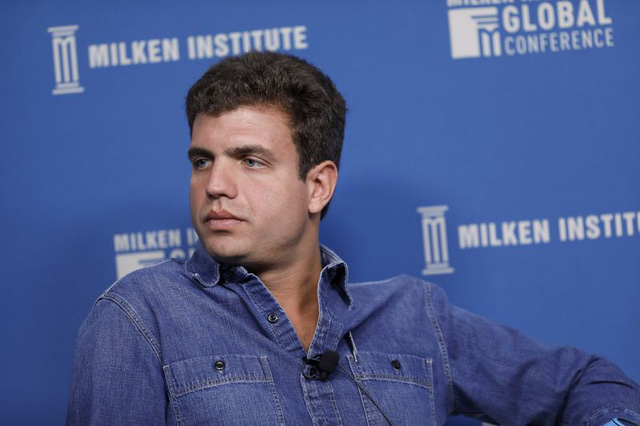The tragedy of a payment unicorn: Backed by Warren Buffett and Jack Ma, once the fastest growing in the world, now on the verge of collapse
- Tram Ho
Andre Street and Eduardo Pontes have enjoyed tremendous growth since the founding of StoneCo Ltd. less than a decade ago.
From the pinnacle of success
The pair have prompted businesses across Brazil to change the way payments are handled, emulating Square Inc. by Jack Dorsey. They attract investors including Berkshire Hathaway Inc. by genius investor Warren Buffett, Chinese billionaire Jack Ma and the Walton family. They became dollar billionaires before turning 40.
Their success also fuels ambitions to change the way banking is done not only in Brazil but also in countries as far away as Portugal, the UK and the Middle East. After that, things were no longer as favorable as before – even on the verge of bankruptcy.

Andre Street (Photo: Bloomberg)
After succeeding with payment methods, Stone set his sights on what promised to make the company even more successful: lending.
A few years ago, StoneCo started offering money to small and medium-sized customers across Brazil but failed to anticipate the possible risks: Rising inflation, a global pandemic, a series of waves The central bank’s aggressive interest rate hikes and an economy are back on the brink of recession. Debt skyrocketed, forcing the company to stop lending last year.
Since then, problems have gotten worse – and investors have grown impatient. Shares of the Sao Paulo-based company fell 88% in midweek New York trading. The company’s $25.6 billion market capitalization evaporated.
From one of the world’s fastest-growing payments technology companies, StoneCo. has become a cautionary tale of the dangers of trying to “overtake” established banks in already dominant markets. for many decades.
“It’s a lesson for all the digital banks and analog platforms in Brazil,” said Malcolm Dorson, portfolio manager at Mirae Asset Global Investments in New York. stars” among technology (fintech) companies in Latin America, but “recently market and competitor risks have discredited the company,” he said.
Other emerging Brazilian payments companies are also being affected. Stone’s biggest rival, PagSeguro Digital Ltd., is down 73% over the past 12 months. Under the control of 58-year-old billionaire Luis Frias, the company also expanded into banking.
While technology has reshaped finance globally, its influence is especially important in Latin America. The region, with just over 8% of the world’s population, is plagued by expensive banking services and is dominated by corporations. Global investors including Softbank Group Corp. and Buffett’s Berkshire have backed these companies to grow.
To the point of collapse
Stone first achieved success by offering a cheaper, easier to use method for businesses that accept card purchases. The platform provides a way to manage how much money that company earns, allowing Stone to estimate their future revenue and make loans based on those predictions. In return, the credit card receivables will be used to pay off the debt.
For Stone, that seems like an easy way to earn extra revenue from its more than 1.4 million customers. But it quickly backfired when Brazil was hit by a “double blow”: the Covid-19 pandemic, rising interest rates and persistent inflation.
Meanwhile, businesses began to turn to other payment companies, meaning Stone no longer had access to their card purchases. Additionally, an industry-wide system that Stone believed would act as a fail-safe system was not functioning properly, Chief Executive Officer Thiago Piau said in an email.
“The blockade regulations put pressure on businesses’ cash flow and some people have been looking for ways not to pay back their loans,” Piau said.
The company posted a loss in August in its second-quarter earnings results and halted lending. Piau said lending opportunities “remain intact” and adjustments are being made to resume.
However, this is not easy as competitors become more fierce and the Brazilian economy looks like it will be deflated by 2022.
For both Street and Pontes, crafting a “return” will take more than their individual efforts.
The two founders have used the proceeds from multiple stock sales since Stone’s 2018 IPO to fuel other payment projects, such as SaltPay, that operate in Europe and South Africa and now expanding into the Middle East. Pontes is the CEO of the company. In its most recent funding round, StoneCo was valued at nearly $9 billion, according to Bloomberg data.
Street and Pontes have stepped down from day-to-day roles at Stone in recent years and moved to join the company’s board. Street is currently the Chairman of the Board of Directors. However, when the crisis hit, he was in charge of meetings with key investors and said that the company launched the loan service at the wrong time.
“Stone is facing a crisis, but it should have done better on communication,” said Jose Augusto Albino, founder at tech-focused asset manager Catarina Capital. .
Analysts at Goldman Sachs Group Inc., Banco BTG Pactual SA and UBS Group AG rated the company as a “good deal” three years ago when it went public. Recently, however, Stone has had low expectations and the company’s value has dropped.
“Over the next 12 months, things will be very difficult,” BTG analysts wrote in a November 2021 document. “Restoring trust takes time and needs to be done in small steps.”
Piau said Stone’s shares show “Brazil’s high-risk business environment and challenging economy, which has nothing to do with the reputation of the founders.”
But more than that, Stone’s debacle has led some investors to become more skeptical of Latin American fintechs. After years of dizzying growth and attracting customers regardless of cost, can startups sell customers more profitable products, such as credit operations?
According to Bloomberg
Source : Genk
